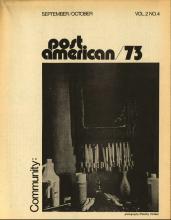There he stands at the assembly line, patiently loading powder and ball bearings into steel globes about the size of a grapefruit. All day long. It can't be an exciting job. But he's probably got a family to feed. Honeywell pays better than his last employer, and he hopes to buy a newer car before the year is out. Like his neighbors, he expects a rising standard of living. But in the empire of Mammon, one person's living means another's death.
Perhaps you have seen the NARMIC slide show on "The automated air war" and have, like me, been appalled at the technological monsters our scientists, corporations, and tax dollars have produced. Winged grapefruit-sized bomblets, spreading out from one big canister bomb, will explode over an area of several football fields and freeze in a deadly instant all that moves and breathes there.
Although in 1973 there was a cease-fire in Indochina, there was no repentance in Washington. The Department of Defense was already planning a $4 billion increase in spending for 1973, and the manufacturers of bombs have contracts to fulfill. Peaceful Canadians also have cause to mourn. Their government, in 1971, was the world's fourth largest seller of weapons.
But what else can we expect in a society of mass consumption and economic competition? When social progress is measured in terms of our gross national product, then we will have prosperity at any price. We have to invest and sell overseas, and must build military bases to protect this wealth. In 1972 the U.S. people taxed themselves $400 per person for "defense"—more than the average person in the third world earned all year. The United Nations told us "that at the end of the 1960s there are more sick, more undernourished, and more uneducated children in the world than there were ten years ago." In the empire of Mammon, one person's living means another's death.
Read the Full Article

